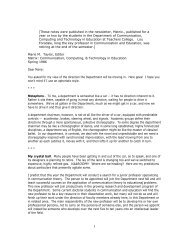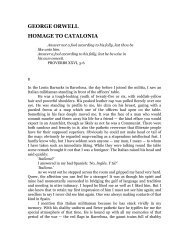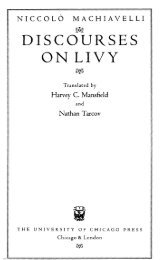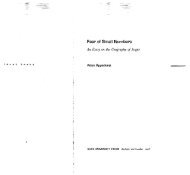THE REPUBLIC OF PLATO - Studyplace
THE REPUBLIC OF PLATO - Studyplace
THE REPUBLIC OF PLATO - Studyplace
Create successful ePaper yourself
Turn your PDF publications into a flip-book with our unique Google optimized e-Paper software.
INTIlODUcnoN<br />
xxiii<br />
death do not seem out of place. The problem is Plato's own. Callicles<br />
is the devil's advocate, standing for those men of the world<br />
who had tried to enlist him, and also for the impulse in Plato himself<br />
which had tempted him to yidd. Even now the trouble was<br />
not laid to rest by his refusal. Some twenty years later (367), when<br />
he was invited to Sicily a second time, he was tormented by the<br />
fear of being taken for a mere dreamer, if he should decline the<br />
opportunity, however unpromising, of carrying his ideas into<br />
practice. 1 His conclusion, when he wrote the Gorgias, was that to<br />
enter politics without sacrificing the ideals he had learnt from<br />
Socrates would be to court Socrates' fate and to incur a usdess<br />
martyrdom. This is indicated where Socrates, after claiming to be<br />
the one man in Athens who understands true statesmanship, adds<br />
that if he were called before a tribunal, he would have no more<br />
chance of acquittal than a doctor arraigned before a jury of children<br />
by a pastry-cook. In the letter already quoted (Ep. vii. 331 n),<br />
among some general reflections on the giving of political advice,<br />
Plato defines the prudent man's attitude towards his own country.<br />
He should express his disapproval, unless he thinks that no one<br />
will listen or it will cost him his life. He must not use revolutionary<br />
violence; if that is the only expedient, he should refrain from<br />
action and pray for the best both for himself and for his country.<br />
All these passages find an echo in the Republic, where the philosopher,<br />
in his enforced inaction, is compared to the traveller taking<br />
shelter under a wall from a driving stornr of dust and hail, 'con~<br />
tent if he can keep his hands clean from iniquity while this life<br />
lasts, and when the end comes take his departure, with good hopes,<br />
in serenity and peace' (496 D, p. 204).<br />
Callicles quotes from Euripides' Antiope a passage where Zethus<br />
urges his twin brother Amphion, who had 'built the walls of<br />
Thebes with ravishing sounds of his mdodious lute,' to abandon<br />
his art and take to the active life. It is significant that this contrast<br />
should occur in a play written towards the close of the war. In the<br />
sixth century the wise man had been a man of affairs, like Solon<br />
1 Ep. vii. 327-8.









